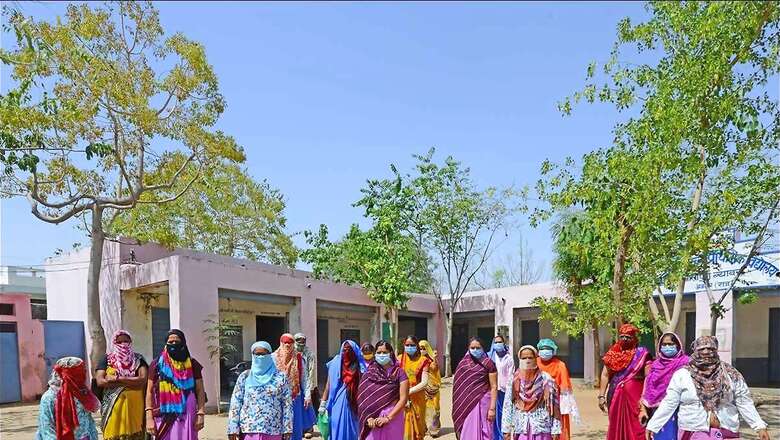
views
Generally speaking, women are underrepresented in the workforce. Be it in our boardrooms or our blue collar workforce, women occupy fewer positions, and are often paid less for their work than the men are. When we boil down why this is, we come to a single answer: the patriarchy. Albeit, it takes culturally nuanced forms the world over.
In India, too, we see the division of men’s work and women’s work. Women’s work almost always involves the care (and unpaid) economy – caring for the sick, the very young and very old, keeping the house in order, and kitchen work. As a result of this thinking, women’s education is made subpar to their male counterparts. This, then, results in unequal opportunities for men and women in the workforce.
Even in jobs like sanitation, where education has traditionally not been a barrier, the same inequality exists. It is considered men’s work, and men are preferred as sanitation workers. This places women sanitation workers at a serious disadvantage – not only are they discriminated against for being women, they are often compensated poorly, because their work is perceived as being of poorer quality than that of a man.
Fortunately, this is changing. Numerous NGOs and grassroots organisations are working hard to dispel these attitudes and mindsets. Harpic, as India’s leading brand in the lavatory care segment has a deep and nuanced understanding of the challenges women sanitation workers face, and particularly so, those who hail from lower castes. With an aim to lift these women from the morass of poverty, exploitation and stigma, Harpic founded the Harpic World Toilet College (HWTC) in 2016.
HWTC was established with the stated objective of improving the quality of life of sanitation workers through their rehabilitation by linking them with dignified livelihood options. Workers trained by the college are provided placement with various organisations. Following the successful proof of concept in Rishikesh, HWTCs have opened in Maharashtra, Aurangabad, in partnership with Harpic, Jagran Pehel and Maharashtra Government.
Today, there are some shining examples of women who have broken through these barriers so spectacularly that they are now hailed as examples of possibility.
Stories of Change
Rekha Sharma: Breaking the Gender Barrier
Rekha Sharma’s journey is a testament to breaking through gender stereotypes. Hailing from a conservative family in Haryana, she defied societal norms to pursue a career in sanitation. Her determination led her to become a sanitation worker in a local municipality.
Through HWTC, Rekha received training that extended beyond the technical aspects of her job. She learned about her rights and how to advocate for them. With newfound confidence, she began challenging the gender disparities in her community.
Rekha’s story is one of empowerment. She initiated conversations about gender equality and women’s rights in her village. Her advocacy work led to changes in local policies, improving the working conditions and wages of women sanitation workers. Today, Rekha stands tall as a champion for gender equality and an inspiration for young girls who dare to dream beyond traditional roles.
Geeta Verma: A Voice for Equality
Geeta Verma’s journey from a sanitation worker to an advocate for equality is a remarkable testament to the power of education and empowerment. Hailing from a remote village in Himachal Pradesh, Geeta faced numerous challenges, from social stigmatisation to hazardous working conditions.
Through HWTC, Geeta acquired the knowledge and skills she needed to improve her work environment and protect her health. Beyond the technical training, she also gained the confidence to challenge the deeply ingrained gender biases in her community.
Geeta’s advocacy for gender equality led to transformative changes. She became a role model for young girls in her village, inspiring them to pursue education and careers of their choice. Her efforts brought about changes in local attitudes toward women’s roles and rights.
Equality Through Education
Training programs like the HWTC are breaking down barriers and empowering these women with education and skills, ultimately fostering gender equality.
When these women graduate from HWTC, they emerge as certified sanitation professionals. They understand the risks their work poses to their health and that of their families, and have the soft skills needed to articulate why they need protective gear and tools.
As the HWTC also undertakes placements, most graduates emerge with jobs in the organised sector – with better pay, a provident fund, and insurance. They now have job security, and that security gives them a firmer footing in the world. Between better pay and insurance, they have the confidence to both save for a rainy day, and spend on the things they need to improve their circumstances.
To say it is a life changing experience is an understatement.
Of course, Harpic isn’t stopping there. Joining hands with News18 to create Mission Swachhta aur Paani, a movement that champions the cause of inclusive sanitation, equality for all genders, abilities, castes and classes and the strong belief that clean toilets are a shared responsibility, Harpic is also creating platforms where the right conversations can happen.
Moreover, by using News18’s reach to get these stories out there, Mission Swachhta aur Paani is creating awareness amongst the larger community about the challenges and triumphs for this community of women that faces extraordinary odds. It’s sobering to note that aside from poverty and a lack of education, the rest of the odds of social exclusion, stigma and discrimination are created (or at least held in place) by people like us.
Often, we don’t even realise the impact of our beliefs. Hopefully, reading this article has changed that. When we change our minds about something, society does too. We have broken through multiple mindsets in this way – we no longer practise slavery, child marriage and sati, for instance. By and large, most of us don’t practise caste based discrimination either – not consciously, at least. We can, however, be conscious in our practice of empowerment.
Join us here, to learn how you can play your part in lifting these women to their rightful place in our society. Together, we can build a more equitable, just, Swachh and Swasth Bharat.
















Comments
0 comment